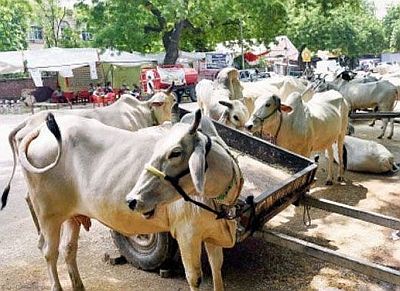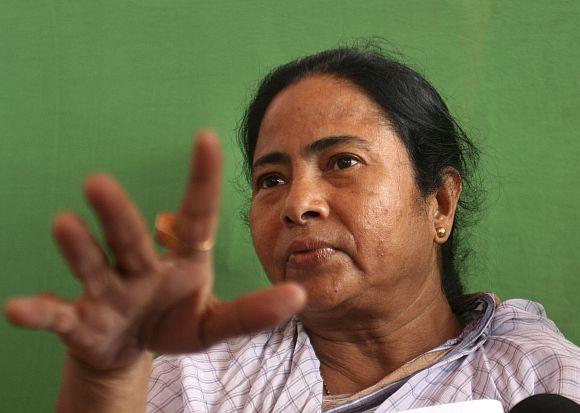 | « Back to article | Print this article |
 The Madras high court on Tuesday stayed for four weeks the Centre's notification banning sale and purchase of cattle for slaughter, and sought its response to public interest litigations which contended that the rules should have been approved by Parliament first.
The Madras high court on Tuesday stayed for four weeks the Centre's notification banning sale and purchase of cattle for slaughter, and sought its response to public interest litigations which contended that the rules should have been approved by Parliament first.
A Madurai bench comprising Justices M V Muralidharan and C V Karthikeyan issued the interim order on the two pleas which said that the rules should be quashed as they were against the Constitution, breached the principle of federalism and were contrary to the parent legislation -- Prevention of Cruelty to Animals Act 1960.

West Bengal Chief Minister Mamata Banerjee told the officials in her administration that there was no need to follow the Centre’s notification banning the sale of cattle for slaughter at animal markets till the state government issued a direction to that effect.
She, however, asked the police to take steps to stop cow smuggling in the border district of North 24-Parganas ‘at any cost’.
Speaking at an administrative review meeting, Mamata said, “Cow smuggling has to be stopped at any cost. The police should take stern action to put an end to it.”
Cattle smuggling in North 24-Parganas district bordering Bangladesh is a sensitive issue with the Bharatiya Janata Party accusing the Trinamool Congress government in the state of not doing enough to put an end to the illegal trade.
Banerjee asked the police ‘to deal sternly with communal flare-ups’, while accusing the BJP of ‘making efforts to incite communal violence’ in the state.
“The police should keep its eyes and ears open. If someone tries to incite communal violence, beat up both the parties. Do not spare anybody, irrespective of the person's political affiliations. The BJP is trying to incite communal violence in the state,” she said.
Speaking on the ban on sale and purchase of cattle at animal markets for the purpose of slaughter, she asked the district administration to ensure that no one followed the Centre's notification in that regard.
“The holy month of Ramzan is on. Everybody has the right to observe religious festivals. Just like Durga Puja, Kali Puja and Christmas, Eid is also observed in our state.
“What one will eat, is his or her choice. No one has the right to dictate it. Do not follow that (Centre’s) order, the state has not issued any such order,” she said.
The administration should ensure that there was ‘no confusion’ regarding the issue, the TMC supremo told the officials at the meeting, adding that till the state government issued an order to that effect, there was no need to follow the Centre's notification.
Referring to the contention of the petitioners that the notification was related to food and hence ought to have been approved by Parliament, the judges asked the Centre to respond to the point also in its counter to be filed in four weeks.
The order has come amid a raging row on the ban, with non-BJP parties and state governments of Kerala, West Bengal and Puducherry stridently opposing the Centre's recent notification.
Several places in Kerala and Tamil Nadu have been witnessing protests during the past few days against the ban on sale of cattle for slaughter. Protesters have alleged that it infringed upon the food habits of people.
The PILs sought quashing of the provisions of Rule 22(b) (III) and Rule 22(e) of the Prevention of Cruelty to Animals (Regulations of Live stock Markets) Rules 2017 on the grounds that they were contrary to the parent act of Prevention of Cruelty to Animals Act 1960 and the country's Constitution.
Petitioners Selvagomathy and Asik Ilahi Bhava contended that the 'provisions breached the cardinal principle of federalism' as it amounted to legislation in the fields earmarked for state legislature.
The new rules notified by the Union environment ministry banned the sale or purchase of bulls, cows, camels for slaughter houses or for sacrifice for religious purpose.
The petitioners said the provisions were notified on May 23 last when courts were on vacation. Such rules should be discussed in parliament and approved by it. Rules prohibiting sale and purchase of animals offended the right to freedom of religion guaranteed under Constitution, they submitted.
"The slaughtering of animals for food, the foods and culinary made out of such animal flesh and offering sacrifice of animals are part of cultural identity of most communities in India, protected under constitution," the PILs said.
They said the rules, which deprived the people of the right to sell or purchase any animal for sale or slaughter as part of meat vending business, were a burdensome interference in the freedom of trade and business guaranteed under the Constitution.
The farmers and other traders involved in sale of cattle or other animals and slaughter houses and its employees would be gravely deprived of their right to livelihood, they said.
The right to choice of food (non-vegetarian or vegetarian) was part of the right to personal liberty and conscience and privacy.
By imposing the ban on slaughter of animals for food, the citizens with the choice of eating meat would be deprived of such food, the petitioners said.
They also contended that the impugned regulations though framed in furtherance of Prevention of Cruelty to Animals Act 1960, which tend to regulate live stock markets to preserve and improve stocks, is in pith and substance a legislation on the fields earmarked for state legislature and breached the cardinal principle of federalism.
The petitioners also said already local bodies had been prohibiting slaughter of animals.
Anti-social elements were policing shops and houses of persons belonging to minority and Dalit communities and had been attacking shops sighting the impugned provisions, they alleged and urged the court to intervene.